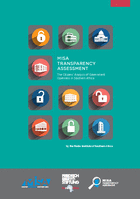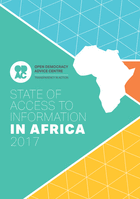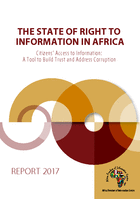Access to Information: An enabling and fundamental human right
State of Access to Information in Africa 2017
State of Access to Information in Africa 2017
As noted, the APAI Declaration was adopted on 19 September 2011, upon a motion for adoption moved by Advocate Pansy Tlakula, Special Rapporteur on Freedom of Expression and Access to Information of the African Commission on Human and People’s Rights and seconded by Honourable Norris Tweah, Deputy Minister of Information, Culture and Tourism for the Republic of Liberia.
This research has demonstrated, however, that the document has had impact beyond its mere “declaration”. Members of the APAI Working Group were able to outline the variety of ways this ambitious Declaration has managed to impact domestic environments.
State of Access to Information in Africa 2017 in respect of SDG 16.10.2
The report focuses on the status of SDG 16.10.2 in terms of adoption and implementation of access to information laws, ratification of African Union treaties that recognize citizens’ right of access to information, state reporting to treaty bodies, association the Open Government Partnership, a key multilateral platform through which the right to information can be advanced.
23 African countries were studied: These include: Cameroon, DRC, Ethiopia, Ghana, Ivory Coast, Kenya, Mali, Malawi, Mauritius, Mozambique, Niger, Nigeria, Rwanda, Senegal, Sierra Leone, Somalia, South Africa, South Sudan, The Gambia, Tunisia, Uganda, Zambia and Zimbabwe.
At national level, the report is both a baseline and advocacy tool. It will assist states in identifying main areas of achievement in terms of policy adoption, implementation and reporting. Citizens and civil society organisations will find the report useful in identifying areas that need their advocacy attention.
MISA Transparency Assessment 2017

This is the ninth MISA Transparency Assessment which analyses the ease or difficulty with which the public can access relevant information held by government and public institutions. The study assesses whether institutions make information proactively available via an online presence and provide helpful information upon request.
In 2017, research was carried out by eight MISA Chapters in partnership with local researches, in Botswana, Malawi, Mozambique, Namibia, Swaziland, Tanzania, Zambia and Zimbabwe.
Read APAI Declaration here

African Platform on Access to Information
PDF, 220 KB

Plateforme africaine sur l’accès à l’information
PDF, 222 KB

المنهاج الأفرٌقً المعنً بالح صول ع لى ا لمعلومات

Plataforma Africana para Acesso à Informação
PDF, 211 KB


